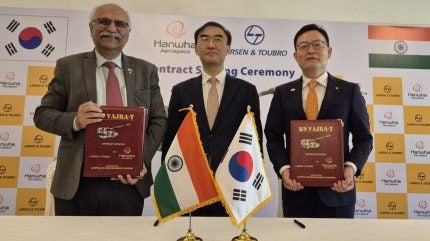
Hanwha Aerospace has secured a $253m contract to supply components to assemble an additional 100 K9 Vajra-T self-propelled howitzers for the Indian Army.
The deal was formalised at the Korean Embassy in New Delhi and signed with Larsen & Toubro (L&T).
It is the second K9 Vajra-T contract from India for Hanwha Aerospace and builds on the delivery of the first 100 units of the howitzer.
The aim of this second contract is to enhance local production from more than 50% to 60%, leveraging expanded industrial cooperation.
The K9 Vajra-T is a 155mm, 52-calibre tracked artillery system based on the South Korean K9 Thunder howitzer. It is co-developed by L&T and Hanwha Aerospace.
It is specifically tailored to meet the Indian Army’s operational needs across diverse terrains, including deserts, plains, and high-altitude regions.
Additionally, it is designed to deliver precision fire at extended ranges and maintain a high rate of fire for both burst and sustained operations.
In December 2024, the Indian Ministry of Defence engaged L&T in a contract to supply the Indian Army with K9 Vajra-T SPHs.
This follows the 2017 award when L&T was contracted for the initial batch of 100 K9 Vajra-T platforms following a competitive bidding process and field evaluations. The company said the units were delivered ahead of schedule.
In the same year, L&T signed a contract with Hanwha which was then known as Hanwha Techwin for self-propelled gun systems for the Indian Army.
In recent times, the defence relationship between South Korea and India has grown, covering land systems, aerospace, and maritime technologies, noted Hanwha.
Hanwha Aerospace CEO and President Jae-il Son said: “This follow-up order reflects the deepening defence partnership between Korea and India.
“We will continue to be a trusted, reliable partner for India’s defence capabilities in the years ahead, supporting India’s vision for defence manufacturing self-reliance.”
India has been investing heavily in modernising its military forces primarily driven by territorial disputes with China and Pakistan.
The country’s defence spending is projected to grow from $77.24bn in 2025 to $89.35bn in 2029, with a compound annual growth rate of 3.7%, as reported by GlobalData.



